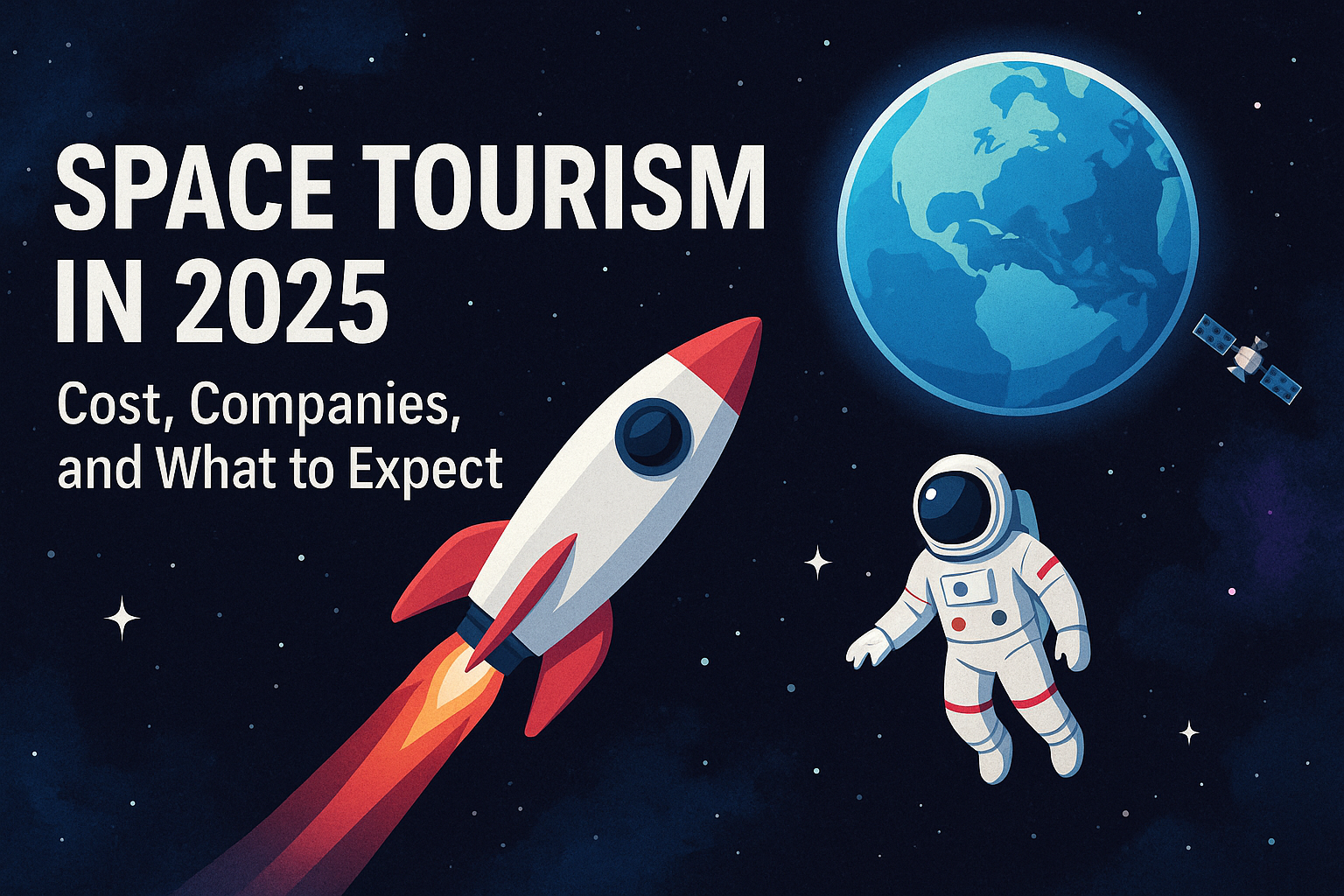Space Tourism in 2025: Cost, Companies, and What to Expect

The idea of leaving Earth for a holiday in space once sounded like pure science fiction. Fast-forward to 2025, and space tourism is no longer just a billionaire’s dream, it’s an emerging industry attracting curious travelers, investors, and technology enthusiasts. With companies like SpaceX, Blue Origin, and Virgin Galactic racing to make space travel accessible, the future of tourism is literally out of this world.
But how much will it cost? Which companies are leading the way? And what can you expect if you sign up for a ticket to space in 2025? Let’s explore.
The Cost of Space Tourism in 2025
Space travel is still far from budget-friendly. Ticket prices remain in the hundreds of thousands of dollars, though costs are slowly coming down as technology improves.
Here’s a quick breakdown of what travelers might pay in 2025:
- Virgin Galactic – Around $450,000 per seat for suborbital flights lasting 90 minutes.
- Blue Origin (New Shepard) – Estimated $250,000–$300,000 per passenger for a short suborbital journey.
- SpaceX (Starship missions) – Prices vary widely, but private trips to orbit or the International Space Station (ISS) are estimated at $55 million per seat, though group trips could lower individual costs.
Interesting fact: Analysts predict that by 2030, the cost of space tourism could drop by nearly 50% as competition and technology improvements accelerate.
While this price point is far beyond average travelers, history shows that advanced technologies usually become more affordable over time. Just as we see with latest tech launches in 2025, today’s luxury can be tomorrow’s standard.
Leading Space Tourism Companies in 2025
Several companies are shaping the future of this futuristic industry:
1. Virgin Galactic
Known for pioneering suborbital flights, Virgin Galactic focuses on giving passengers a few minutes of weightlessness and stunning views of Earth.
2. Blue Origin
Founded by Jeff Bezos, Blue Origin’s New Shepard rocket offers similar suborbital flights. The company’s focus on reusability aims to make space trips more frequent and sustainable.
3. SpaceX
Elon Musk’s SpaceX is leading the way in orbital and long-duration space travel. From private ISS trips to planned lunar missions, SpaceX dominates the deep-space tourism vision.
4. Axiom Space
Axiom is developing private space stations where tourists could spend days or weeks in orbit. Their first commercial station is set to launch later this decade.
What to Expect as a Space Tourist
Booking a ticket to space in 2025 is not like reserving a flight to Paris. Travelers undergo medical screenings, several days of training, and simulations to prepare for zero gravity and high G-forces.
Here’s what space tourists can look forward to:
- Weightlessness: A few minutes to hours of floating in microgravity.
- Unparalleled Views: Seeing Earth’s curvature and the thin blue atmosphere from above.
- Luxury Training Programs: Companies are adding VIP-style astronaut experiences to make the journey memorable.
- Sustainability Efforts: With growing concern about climate impact, companies are testing eco-friendlier fuels and reusable spacecraft.
It’s similar to how AI is reshaping other industries. Just like the future of AI and technology, space tourism promises both excitement and ethical questions.
Sustainability and Challenges
Space tourism faces serious questions about safety, accessibility, and environmental impact. Rocket launches release significant carbon emissions, raising concerns about sustainability.
The good news is that companies are working on eco-friendly solutions, similar to sustainable and eco-friendly innovations in 2025. Hybrid fuels, reusable rockets, and carbon offset initiatives are part of the conversation.
FAQs About Space Tourism in 2025
Prices range from $250,000 to $450,000 for suborbital flights. Longer orbital missions can cost tens of millions per seat.
The top players include Virgin Galactic, Blue Origin, SpaceX, and Axiom Space.
While companies invest heavily in safety, risks remain higher than traditional air travel. All passengers undergo health screenings and pre-flight training.
Final Thoughts
Space tourism in 2025 marks the dawn of a new era in human exploration. With falling costs, expanding companies, and increasing demand, the dream of traveling beyond Earth is closer than ever.
For more futuristic tech trends and updates, stay tuned to TechySpeed.com, your hub for everything innovative and inspiring.


